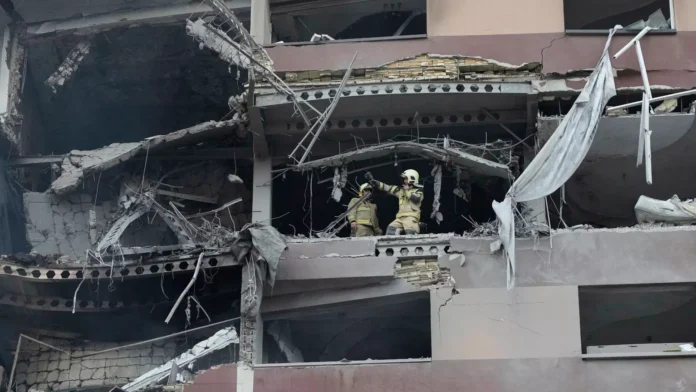New Jersey is a state of vibrant communities, thriving commerce, and diverse populations. While our focus often remains on local developments, the reality is that major global events send ripples across the world, and their impact can be felt right here in the Garden State. The recent escalation of tensions between Israel and Iran, culminating in an Israeli attack on Iranian nuclear and military facilities, is one such event that warrants our attention. At Explore New Jersey, we aim to shed light on how these international shifts affect our daily lives, from heightened security measures to the ongoing political discourse and potential economic implications.
A New Chapter in a Long-Running Conflict: The Israeli Strike
Early on Friday, June 13, 2025, Israel launched a significant attack on Iran, targeting what it described as Iranian nuclear and military facilities. This aggressive move marked a dramatic shift in what has largely been a “shadow war” between the two nations, bringing their long-standing conflict into open confrontation. Iranian state media reported devastating consequences, including explosions in Tehran and the tragic deaths of the leader of Iran’s paramilitary Revolutionary Guard, General Hossein Salami, and two top nuclear scientists.
Israeli Prime Minister Benjamin Netanyahu stated that the strikes were aimed at preventing Iran from acquiring a nuclear bomb, emphasizing that the Natanz atomic facility, Iran’s main enrichment site, and its ballistic missile arsenal were key targets. This action comes amidst escalating concerns over Iran’s rapidly advancing nuclear program, which Israel views as an existential threat. For its part, Iran has consistently maintained that its nuclear program is peaceful, a claim supported by U.S. intelligence assessments that have not indicated active weapon building.
The attack has thrown the region into an uncertain and potentially dangerous new phase. Reports from Tehran describe massive explosions, with footage showing widespread damage to residential buildings and the Revolutionary Guard’s headquarters engulfed in flames. In anticipation of potential retaliation, Israel swiftly closed its airspace and called up tens of thousands of soldiers to secure its borders.
The Nuclear Question: How Close is Iran?
A central point of contention remains the proximity of Iran to developing a nuclear weapon. Netanyahu’s assertion that Iran “could produce a nuclear weapon within a very short time” if left unchecked is a stark warning. While experts generally agree that it would likely take Iran months to build a weapon, should it decide to, questions also linger about its ability to miniaturize a bomb for missile deployment.
Tensions surrounding Iran’s nuclear ambitions have been simmering for years, particularly since the U.S. unilaterally withdrew from Tehran’s 2015 nuclear deal. Just prior to the recent strikes, the atomic watchdog agency censured Iran for failing to comply with nonproliferation obligations. In response, Iran announced plans to open a previously undisclosed enrichment site and accelerate its production of 60% highly enriched uranium, a level that could be easily processed to weapons-grade.
Iran’s two main enrichment sites, Natanz and Fordo, have long been flashpoints. Both are built with defensive measures against airstrikes, with Natanz being underground and Fordo deeply embedded within a mountain. These sites have been central to renewed diplomatic efforts, with the Trump administration attempting to negotiate limits on uranium enrichment in exchange for lifting economic sanctions. However, these indirect talks have been stalled, and the recent attack has cast further doubt on whether negotiations, including an expected sixth round in Oman, will proceed.
Repercussions in the Garden State: Security, Politics, and Economy
For New Jersey, the most immediate and tangible impacts of this international escalation are felt in several key areas:
- Increased Security: Following the Israeli strike, authorities in nearby New York City have notably increased security at Jewish and Israeli sites as a precautionary measure against potential retaliation. Given the close proximity and interconnectedness of our region, New Jersey’s own security awareness is naturally heightened. Our state’s Office of Homeland Security and Preparedness continually monitors global threats, adjusting protocols to ensure the safety of communities.
- Political Reactions and Discourse: The situation has undeniably contributed to a charged national political environment. Here in New Jersey, politicians are actively engaged in the dialogue. U.S. Senator Andy Kim, a prominent Democratic voice, has expressed concerns that the Israeli strikes may have been intended to disrupt ongoing nuclear negotiations between the United States and Iran. These discussions reflect the complex nature of foreign policy and how actions abroad can influence critical diplomatic efforts, with New Jersey voices contributing to the national debate.
- Potential Economic Impacts: While not directly tied to specific events within New Jersey, the conflict raises broader concerns about potential disruptions to global oil and shipping supply chains, particularly those reliant on the Strait of Hormuz. Any significant disturbances could lead to higher freight rates and increased insurance costs. These economic ripple effects could eventually impact businesses and consumers throughout New Jersey, as our state’s economy is deeply integrated into global markets.
- Heightened Public Awareness: An increase in global tensions naturally leads to heightened security awareness among residents. While specific threats against New Jersey have not been identified, this general climate can foster a stronger sense of community vigilance and preparedness.
In the wake of this significant development, Iran’s Supreme Leader Ayatollah Ali Khamenei has threatened “severe punishment,” with other Iranian officials echoing warnings of vengeance. From Washington, President Trump has asserted that the U.S. was not involved in the attack and has warned Iran against retaliating against American interests in the region.
The Israel-Iran conflict underscores how events seemingly distant can resonate deeply, affecting security, shaping political discourse, and potentially influencing economic stability in our interconnected world. New Jersey, ever resilient, will continue to monitor these developments while focusing on ensuring the safety and well-being of its residents.
To stay informed on how global events shape policies, security, and discussions within New Jersey, explore our dedicated Politics section.












